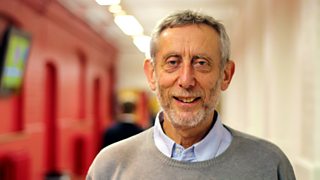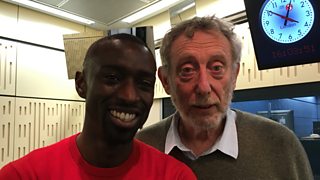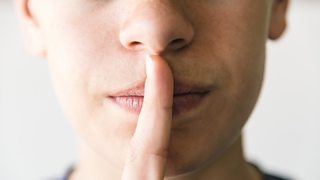What was the first language?
When did our meat-scavenging, fire-harnessing ancestors first learn to talk? And is it possible to trace the thousands of languages that exist today back to a single ancestor?
In Word of Mouth, Michael Rosen and Dr Laura Wright are joined by anthropologist Robert Foley and linguist Maggie Tallerman, two people who have given the early years of language a great deal of thought, to discuss the primal sources of speech.
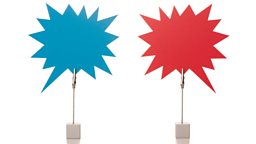
-
![]()
Word of Mouth: The First Language
Michael Rosen and linguist Dr Laura Wright investigate our earliest languages.
An evolutionary game changer
Human beings are the only species that have language, something that makes us unique amongst all animals. This ability to converse has been called one of the major transitions in evolution – a game changer unlike any other. For this reason, people have been forever fascinated by the origins of language.
“Language is one of the little complex of things that makes us human,” says Robert Foley. “If we want to understand being human, we need to understand language.”
Language could be half a million years old
For most of us, if we were asked to name an ancient language we’d probably come up with Babylonian, or Ancient Egyptian. But this is nowhere near the beginning of the story, says Maggie Tallerman. In fact, these languages are fundamentally the same as all modern languages today. At just 6000 years old, these “ancient languages” are linguistic spring chickens.
Everyone in the know is relatively happy with the dating of language to at least 50,000 years old but most linguists think its considerably older than that, with some believing it could be as much as half a million years old.
How many words does it take to learn a language?

The importance of frequently used words when learning an additional language.
All languages could spring from one common ancestor
Despite the wealth of different languages in the world today, it’s possible that all our current languages are descended from one common ancestor.
This is supported partly by the biology of our evolution: genetics suggest that we come from a relatively small population in Africa. Although there might have been other languages outside that lineage, the ones we see now probably all descended from modifications of the same language.
Fossils can help us to date the birth of language
The fossils of our ancestors do give us some clues as to when we started talking.
Itβs possible that all our current languages are descended from one common ancestor. Genetics suggest that we come from a relatively small population in Africa.
Speech is, in a way, fancy breathing, says Robert: “We’re just breathing with enormous control to make sounds.” In order to do this we have to have muscular control of our diaphragm, and as such, our diaphragm has a lot more nerves going into it than the diaphragm of our closest, non-speaking relatives, the apes. All these nerves mean that our spinal cord is a little bit thicker in that area than in apes, and the vertical column has to be a little bit wider too.
If you look at Neanderthals from around 600,000 years ago, they have this expansion in the spinal column. But if you go back a million years to Homo erectus, an earlier species of archaic human, this expansion isn’t there. That gives us a kind of timeframe for when humans started to use language.
Genetics play a part too
The FOXP2 gene is common in all primates but as humans we have a mutant version. Mutations in this gene could help explain why humans can talk but chimps cannot. We know it has a crucial role in speech because people who have the non-mutant form of the gene often have trouble developing language.
Interestingly, Neanderthals had the same variant of the FOXP2 as we do, which supports the theory that they possessed some form of speech. But whether they had the full monty is another matter entirely. Speech does not equate to language and language itself is very hard to detect from the genetic evidence.
What about the size of the brain?
Can the cranium size of early humans help to date language? Not really. For the simple reason that we don’t know how big a brain it takes to make language. In fact, Neanderthals had brains bigger than our own because they were larger animals.
The first human word might have been βheyβ
When we talk about a proto language – one preceding the type we’re talking now – can we possibly tell what the first words might have been? We haven’t the foggiest, says Robert.
Looking at primates for possible clues, they have what primatologists would call “words” for predators - they make sounds that other members of their group will recognise as “eagle” or “leopard”. You could argue that those very simple, concrete things in the environment around us would have been the first words uttered by humans.
But, as Maggie points out, those alarm calls are not word-like because they don’t combine. As such, monkey alarm calls may be a whopping red herring. An alternative theory is that the earliest words were like the kind we have today that don’t combine, like “shh”, “psst”, “hey”, “wow”, “thanks” or “goodbye”.
What is bad language?
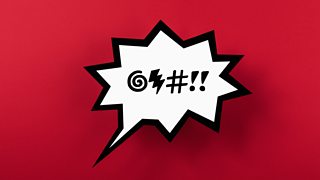
Where bad language comes from and what defines it.
Mealtimes might be behind the development of language
Early humans may have started talking more in order to exploit their environment and eat different foods.
Speech is, in a way, fancy breathing.
Our ancestors started scavenging and tucking into the carcasses left behind by large predators. But if you want to feast on remains that a pack of hyenas has dibs on, then you had better have a bunch of mates with you for protection. And if you’re out one day and you find a carcass, you need to be able to go back to camp and communicate where it is. The earliest referential forms of language might have been used to do just this.
And gossiping too might have played its part
The argument that we use language for very sophisticated communication is greatly overrated. An awful lot of what we say is about building alliances or getting the lowdown: chitchat, nattering and gossip are largely the day-to-day, bread and butter of speech. More than getting each other to do things, talking might have been about social grooming.
When did we start telling stories?
We needed to have an awful lot of language to be able to construct narrative, tell stories, and create rituals, so that may have come a long way down the line – probably hundreds of thousands of years after the initial steps were taken to talk.
More from Radio 4
-
![]()
Word of Mouth - The First Language
Michael Rosen and linguist Dr Laura Wright investigate our earliest languages.
-
![]()
Eight words for the love of stuff and things
Expand your lexicon of love on Valentineβs Day with a list of words for our love of things.
-
![]()
An exploration of black-related words
Exploring black British identity through language.
-
![]()
The glories of being quiet
Why we need silence, how we lost it and where we might go to find it again.
